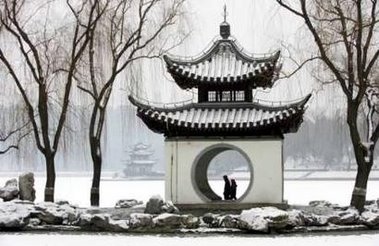
Click on the title of this post to be directed to "A Touch of Zen" website, from which the excerpt came...
Let us start with the question: “who is the founder of Zen?”
Bodhidharma came to China in the 6th century and it was he that was generally credited as the founder of Zen. Some say that this was not the case. They say that Huineng was the real founder of Zen in the 8th century. Huineng’s enunciation that prajna and jhana should go together and that one should not practice jhana first until proficient was a startling reversal to the previous Patriarchs. One cannot have jhana without prajna and vice versa. Prajna is intuitive wisdom, which is equivalent to enlightenment.
The Noble Eightfold Path is composed of three disciplines: 1) moral precepts, 2) meditation (jhana), and 3) prajna (transcendental wisdom). So with Huineng’s teachimg, prajna (enlightenment) is synonymous with jhana (meditation). This is Zen Buddhism. Whereas before Huineng, meditation comes first, and when meditation succeeds wisdom and enlightenment arise. But prajna cannot be attained with discursive knowledge. It is intuitive knowledge. In other words, while we are thinking, talking and feeling, Zen and prajna are present at the same time. Zen and prajna are not two different items: they are one and the same thing. When one sees a flower, the flower must see one as well. This is then the real seeing. Also knowing alone is not enough. Seeing must come with knowing: seeing is direct experience and knowing is philosophical, knowing about. So in Zen context, the seeing and knowing must move up to a higher plane, and this intuitive seeing becomes prajna, which is jhana. When Zen talks about feeling and desire it should be reminded that these feelings should not refer to the selfish relative self. It should refer to something higher, so that it becomes intuition---enlightenment. It must also be collective or total intuition, which becomes real understanding of reality i.e. enlightenment. This is what Zen tries to achieve. In practice, Zen means doing anything perfectly: making mistakes perfectly etc. In other words, there is no egoism in what we are doing. The whole activity is harmonious. The perfect pain that we suffer is universal pain. The joy is universal joy.
Zen has no dogmas, no ritual, no mythology, no church, and no holy book. In all its varied and deep experiences of life and culture, there is usually a similar taste of depth of oneness. But there is also separation. Egolessness and ego are also absorbed in this depth of voidness. Zen is interesting and has good taste. Its mountains are more mountainous. Actually nobody understands Zen. Nobody can explain it. Zen arises spontaneously out of the human heart: not a special revelation to anyone. When goodness, truth and beauty are all present, as one, there is Zen. To grasp movement in stillness, and stillness in movement, this is Zen.
No comments:
Post a Comment